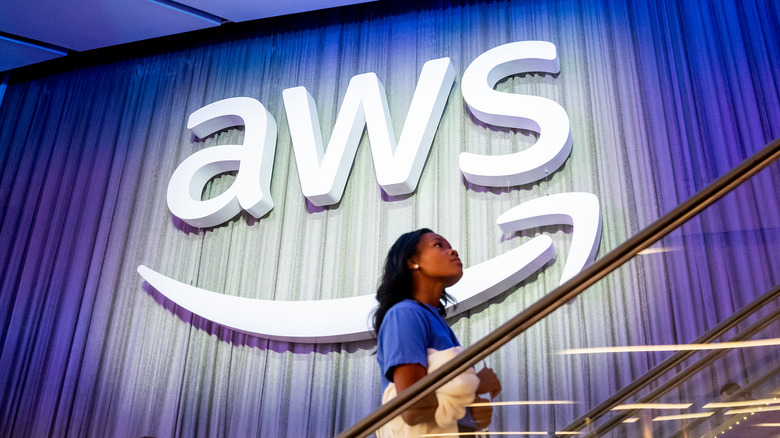The Amazon Web Services Outage Even Broke People's Beds
The tech we use every day is a lot like the titular wizard of Oz. It seems to work like magic, but behind the digital curtain is a lot of machinery creating that illusion. Whether you're swapping selfies on Snapchat or bingeing shows before Hulu gets phased out, there's a data center somewhere making it all happen. These facilities house countless computers chugging away 24/7 to make sure you can scroll, game, and even do your banking online. But big data comes with big risks, as shown when Amazon Web Services (AWS) took down a number of popular services and products when it experienced an outage on October 20, 2025. Among them: some people's smart beds.
Highlighting how deeply interwoven into our lives big data has become, the AWS disruption even managed to break some people's beds. More specifically, proud owners of the Eight Sleep system found their expensive, water-cooled mattress covers temporarily turned into literal wet bags. The incident prompted the company to develop a failsafe to appease users, many of whom were stunned to learn that server-side turbulence could lead to an equally turbulent night's sleep. Here's what happened, and why the story is significant regardless of whether your bed uses Wi-Fi.
Amazon's outage turned Eight Sleep smart beds into wet bags
Eight Sleep was affected by a widespread outage of Amazon Web Services on October 20, 2025, leaving its users tossing and turning. The Eight Sleep system is essentially a mattress cover that pumps temperature-controlled water through a base station, reading a user's body temperature overnight and heating or cooling them accordingly. The company also offers pillow covers and blankets, as well as a base that adjusts the position of the mattress. The system is generally well-regarded, but it's also pricey. The whole kit and caboodle can run over $7,000, with an additional monthly subscription, so customers may justifiably expect a premium experience.
That experience was disrupted Monday night, when Eight Sleep owners found their expensive bed kits unresponsive. "Love my Pod 4 but Internet Outage = Bed Outage? Really?" wrote one user on Reddit, referencing the company's last generation flagship product. Another claimed that their girlfriend's side of the bed was locked at a sweltering 110 degrees Fahrenheit. CEO Matteo Franceschetti acknowledged the situation in a post on X, promising to roll out an update that would keep Sleep Eight systems functional during an outage.
An update was rolled out on Tuesday, adding an "outage mode" that provides Sleep Eight users with basic functionality even if the servers go down. Owners will now be able to use Bluetooth to turn their beds on and off, adjust mattress positions, and change the temperature. Of course, by tying Sleep Eight functions to an Internet-connected subscription, this kind of service interruption was always a possibility. At least users can rest assured that they won't be totally out of luck in case AWS goes down again.
Eight Sleep's woes highlight the dangers of a centralized Internet
Amazon, Google, and Microsoft make up the bulk of the cloud services market. Combined, they support virtually every popular app, service, and IoT product relied on by billions of users across the world. When a problem occurs with any of these, the fallout often brings critical services crashing down, much like the CrowdStrike outage that cost the economy billions in 2024. Though not a compute provider, CloudStrike's cybersecurity software is woven through enough digital infrastructure that a cascading failure even caused airplanes to be grounded.
Moreover, the Eight Sleep incident points to the temporary nature of any product that needs a server to function. There is a documented pattern of companies turning off servers, leaving customers with a product that no longer works. In October 2025, Bose announced it's pulling the plug on its SoundTouch smart speakers, turning them into dumb speakers. In 2024, Spotify stopped supporting its Car Thing player, leaving it non-operational. And who could forget when Google killed Stadia? To its credit, Google refunded owners of its cloud gaming controller and gave them a way to turn Stadia into a Bluetooth controller, but not every company is so kind. Besides, that support window has closed.
Consumer rights advocates and environmentalists have pushed for laws that would force companies to issue clear end-of-support timelines and clarify which features users will lose. Those efforts have so far seen scant results. Meanwhile, others, such as the Fulu Foundation, have launched efforts to tackle these issues from the user's end by helping users build fixes for defunct "zombie" devices.


